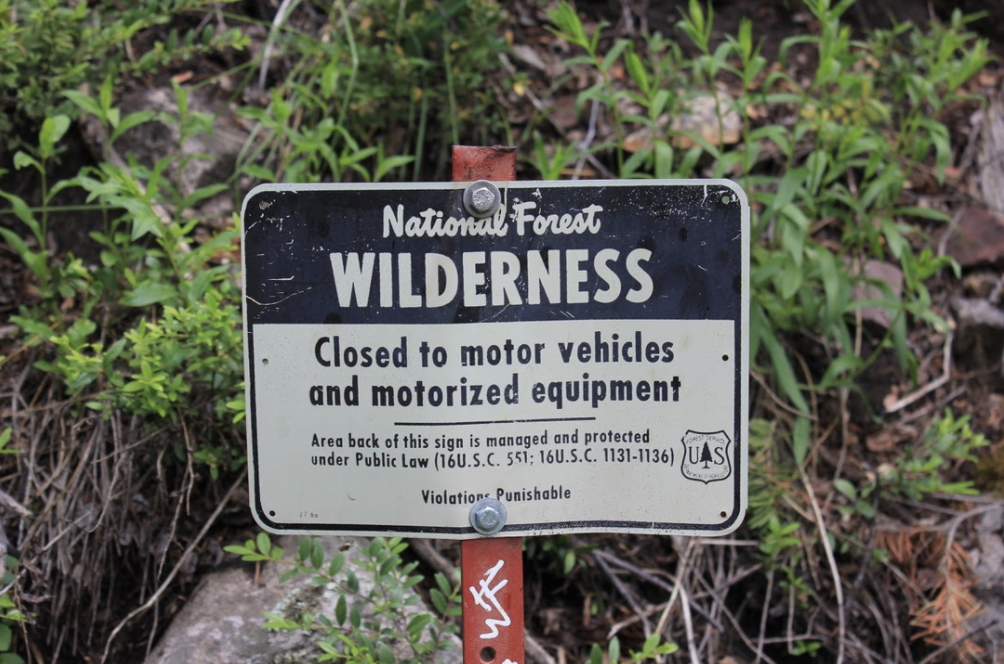Tucked in the crest of the Snake River Range and in the heart of northwestern Wyoming’s wilderness lies the Palisades Wilderness Study Area. There, you can find people hiking, snowshoeing, birdwatching, canoeing, flat-water kayaking, and most notably, mountain biking. The latter activity has sparked an enormous controversy in nearby Jackson, Wyoming. In 1984, the Palisades were designated as a Wilderness Study Area (WSA), meaning that it is wild enough that it has the potential to one day be incorporated into the National Wilderness Preservation System. The Wilderness Act of 1964 which created this system defines “wilderness” as “an area where the earth and its community of life are untrammeled by man, where man himself is a visitor who does not remain”.
Mountain biking in the Wilderness Study Area sparked a lawsuit against the Bridger-Teton National Forest. The charge is led by Mountain Pursuit, a hunting advocacy group ardently dedicated to the protection of wildlife (JH News & Guide). From their perspective, mountain bike use in the WSA has increased in the last several decades, thereby violating the rules set out when the Palisades were first designated. The law states that motorized and mechanized use must remain the same from the time when the land became protected, which in this case is 1984. High recreation use has shown to have negative effects on big game populations like elk and moose, which Mountain Pursuit is striving to protect.

The debate over outdoor recreation use in this area points to a larger conversation that has been growing in Jackson and the surrounding area for years. How much recreation is too much? How do we balance growing recreation and protection of wildlife, both of which fuel Jackson’s economy and are part of what makes it so unique? Discussions and lawsuits over the Palisades have led rivaling recreation interest groups to pop up, such as Advocates for Multi-Use of Public Lands (AMPL) and the Teton Freedom Riders. AMPL founder, Jesse Combs, commented that he “rejects any special interest group who tries to push other recreationists out in the pursuit of an ‘all for me’ ideology when it comes to our public lands” (JH News & Guide). This has led to a deep division within Jackson’s recreation community that is centered around differing opinions about how to prioritize access to public lands. For example, is it absolutely paramount to have all access, or are there exceptions that should be made for wildlife and wilderness? In the past, it was easy for recreationists to find a common enemy in groups like oil and gas companies coming into the area to disrupt the landscape. But now, the perceived “enemy” is different. Oftentimes, it is a neighbor of 20 years, or a longtime friend.
What the Jackson community faces is what Yale researcher and professor Dr. Susan Clark labels a Type 3 problem: deeply embedded and constitutive problems that arise from society’s underlying narratives and unconscious patterns of behavior (Mountain Journal). One of the local Jackson residents we interviewed this past spring says that for them, it really comes down to values. How highly do you perceive your need to recreate versus the need to protect these wild spaces in the first places? Jackson is often called the “birthplace of modern conservation,” however recreation is increasingly coming into conflict with wildlife and conservation. What does this tell us about how Jackson’s community mindset and interests have shifted over the last twenty years, and what they will become?
For now, the Bridger-Teton National Forest has dismissed Mountain Pursuits claims that they are violating the 1984 Wyoming Wilderness Act. Forest Supervisor Tricia O’Connor said “with the exception of the Black Canyon and Lithium trails near Teton Pass, we have no evidence to indicate that mountain biking has significantly increased in the wilderness study areas” (JH News & Guide). For now, it remains to be seen how this lawsuit will play out. However, there is no doubt that the debate around the Palisades will have longer lasting effects on the recreation communities of Jackson and the community conversation around access, wilderness, and wildlife.
Bea Portela, Research Assistant and Western Resources Fellow |Bea is an undergraduate in Yale College majoring in Environmental Environmental Studies (BS) and Political Science. Before coming to Yale, she participated in research on dam removal, science communication, and the coastal ecology of her native southeast Texas. With Ucross High Plains Stewardship Initiative and the Northern Rockies Conservation Cooperative (NRCC), Bea studies perceptions of recreation in the Greater Yellowstone Ecosystem, analyzing the norms that inform individual behavior and policy. As a Western Resources Fellow, she continues to work with NRCC and the Bridger-Teton National Forest to study the narratives of different communities within Jackson, WY and how community members engage with the surrounding land. Bea is interested in public lands management and advocacy, limnology, contiguous wilderness protection, and rural development.| Blog

